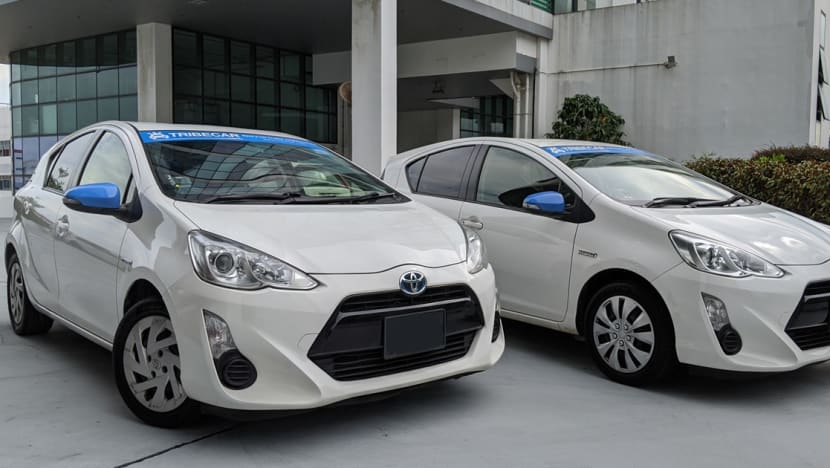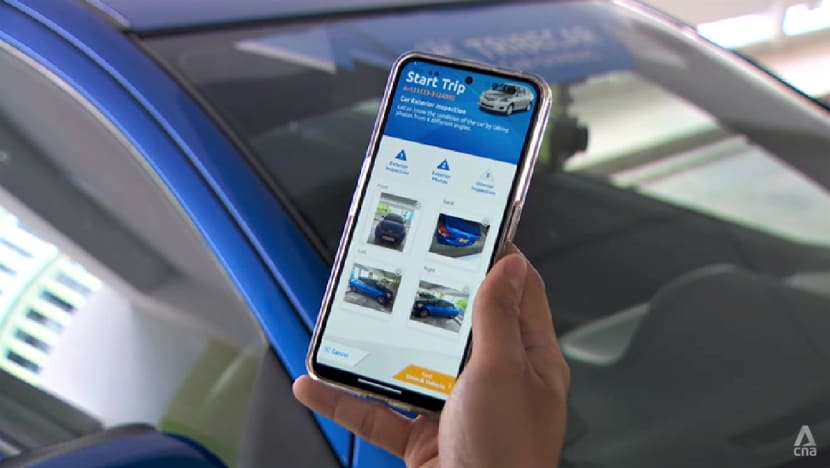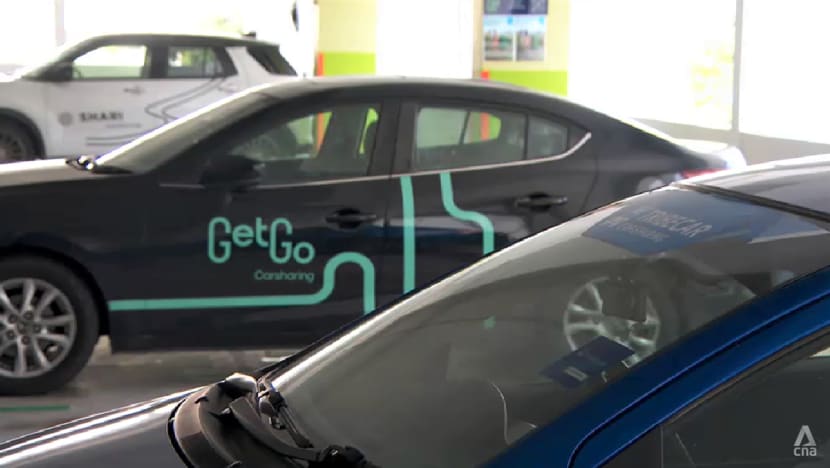Car-sharing is here to stay amid rise in membership sign-ups, say observers
This comes amid soaring Certificate of Entitlement (COE) premiums, which have made owning a car too expensive for some people.

A photo of Tribecar vehicles. (Photo: Facebook/Tribecar)

This audio is generated by an AI tool.
SINGAPORE: Car-sharing companies in Singapore are seeing a 30 to 50 per cent jump in user sign-ups over the past year.
This comes amid soaring Certificate of Entitlement (COE) premiums, which have made owning a car too expensive for some.
But observers told CNA that car-sharing is here to stay even if COE prices fall.
CHEAPER THAN OWNING A CAR
Car-sharing user Teng Jia Wei, for instance, signed up for a car-sharing service five years ago.
He had once expected to purchase his own car one day. But these days, it seems like car-sharing might be a permanent lifestyle choice for him.
“Car-sharing is much cheaper than owning a car. Nowadays, the COE is very expensive. So I'll prefer to use car-sharing instead,” said Mr Teng.
“For myself, I'll need to send my parents and siblings around. When we go out to eat, I'll need a bigger car to bring them around.”
One upside of car-sharing that he enjoys is the variety of vehicles located near his home that he can choose from with just a few clicks on his phone application.
The affordability is another factor driving him to use such services, said Mr Teng, who pays about S$9 (US$6.72) an hour to book a Toyota Vios.
Car-sharing company TribeCar said it has seen an increase in user sign-ups of about 30 per cent in the past year. However, the prices may not stay low for long, said the firm.
“We do have concerns if the COE continues to stay this high for the next couple of years,” said Mr Adrian Lee, co-founder of TribeCar.
“For many services such as ours, we can still supplement and keep costs low if we retain the use of the slightly older vehicles. However, if those older vehicles have to be replaced with brand new vehicles, then costs may drastically increase.
“So we look to the government to intervene and moderate such costs for our customers.”

HIGH COE PREMIUMS
Mr Lee, who is also the vice-president of the Vehicle Rental Association Singapore, said it is a common sentiment echoed by other car-rental and car-sharing companies, which are worried that the high COE prices will translate to higher operating costs.
TribeCar, which has about 1,400 vehicles across Singapore, does not intend to drastically change its fleet size given the high COE premiums.
“Instead, we are looking at ways to refresh the fleet and make sure the customer experience is still good,” said Mr Lee, adding that the biggest priority is to keep costs low.
“At the same time, we are experimenting with new business models, such as engaging private car owners to rent out their cars on our platform on the weekends.”
COE premiums for larger cars have stayed above S$100,000 since October last year. The government has brought forward the supply of COEs from peak years in a bid to quell prices.
In the latest bidding exercise on Nov 22, premiums for larger and more powerful cars in Category B rose to S$135,336 from S$110,001.
Open category COEs, which can be used for any vehicle type but end up being used mainly for large cars, also went up to S$135,002 from S$125,011.
Meanwhile, premiums for Category A cars, or those 1,600cc and below with horsepower not exceeding 130bhp, closed at S$85,001.

GOING CAR-LITE
The move away from owning a car is a reflection of Singapore's shift towards going car-lite, said analysts.
“We have to realise that Singapore cannot sustain a lot of cars on our small island because of our limited space,” said Associate Professor Raymond Ong of the Department of Civil and Environmental Engineering at the National University of Singapore (NUS), adding that the country also needs space for other needs.
He believes that there could be a slight dip in users if car-sharing companies raise prices due to the higher costs of buying a car.
Yet he expects car-sharing behaviour to stay as commuters, particularly younger people, grow more environmentally conscious.
They believe “in a much more sustainable transportation, rather than owning an asset that they will only use on specific times of the day”, Dr Ong said.
“They will rather go for sharing services, whereby it is on a as-need basis.”
For instance, younger people make up the bulk of TribeCar’s users. This year alone, almost 70 per cent of those who signed up with it were aged 18 to 35.
To support Singapore’s car-lite aspirations, public transport, walking and cycling infrastructures are being ramped up to help commuters travel seamlessly, said Dr Ong.
“There is a general trend for younger segments of the population to be less likely to own a car or to be less likely to even have a licence to drive.”
He believes more people will walk and cycle, or use public transport for daily commutes in future, and use car sharing or ride sharing occasionally.
“We may actually see that we have multiple users using one car, and this means that there’s a more efficient use of a vehicle. We may have less vehicles on the road,” said Dr Ong.
“Basically, if there are less cars on the roads and a more efficient use of transport modes, there will be a lower carbon emission from the land transport sector.”




















